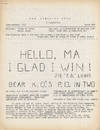

Pylon
by Faulkner, William
- Used
- good
- Paperback
- Condition
- Good
- Seller
-
Yucca Valley, California, United States
Payment Methods Accepted
About This Item
Synopsis
William Faulkner was born in New Albany, Mississippi, on September 25, 1897. His family was rooted in local history: his great-grandfather, a Confederate colonel and state politician, was assassinated by a former partner in 1889, and his grandfather was a wealth lawyer who owned a railroad. When Faulkner was five his parents moved to Oxford, Mississippi, where he received a desultory education in local schools, dropping out of high school in 1915. Rejected for pilot training in the U.S. Army, he passed himself off as British and joined the Canadian Royal Air Force in 1918, but the war ended before he saw any service. After the war, he took some classes at the University of Mississippi and worked for a time at the university post office. Mostly, however, he educated himself by reading promiscuously. Faulkner had begun writing poems when he was a schoolboy, and in 1924 he published a poetry collection, The Marble Faun , at his own expense. His literary aspirations were fueled by his close friendship with Sherwood Anderson, whom he met during a stay in New Orleans. Faulkner's first novel, Soldier’s Pay , was published in 1926, followed a year later by Mosquitoes , a literary satire. His next book, Flags in the Dust , was heavily cut and rearranged at the publisher’s insistence and appeared finally as Sartoris in 1929. In the meantime he had completed The Sound and the Fury , and when it appeared at the end of 1929 he had finished Sanctuary and was ready to begin writing As I Lay Dying . That same year he married Estelle Oldham, whom he had courted a decade earlier. Although Faulkner gained literary acclaim from these and subsequent novels— Light in August (1932), Pylon (1935), Absalom, Absalom! (1936), The Unvanquished (1938), The Wild Palms (1939), The Hamlet (1940), and Go Down, Moses (1942)—and continued to publish stories regularly in magazines, he was unable to support himself solely by writing fiction. he worked as a screenwriter for MGM, Twentieth Century-Fox, and Warner Brothers, forming a close relationship with director Howard Hawks, with whom he worked on To Have and Have Not , The Big Sleep , and Land of the Pharaohs , among other films. In 1944 all but one of Faulkner's novels were out of print, and his personal life was at low ebb due in part to his chronic heavy drinking. During the war he had been discovered by Sartre and Camus and others in the French literary world. In the postwar period his reputation rebounded, as Malcolm Cowley's anthology The Portable Faulkner brought him fresh attention in America, and the immense esteem in which he was held in Europe consolidated his worldwide stature. Faulkner wrote seventeen books set in the mythical Yoknapatawpha County, home of the Compson family in The Sound and the Fury . “No land in all fiction lives more vividly in its physical presence than this county of Faulkner’s imagination,” Robert Penn Warren wrote in an essay on Cowley’s anthology. “The descendants of the old families, the descendants of bushwhackers and carpetbaggers, the swamp rats, the Negro cooks and farm hands, the bootleggers and gangsters, tenant farmers, college boys, county-seat lawyers, country storekeepers, peddlers—all are here in their fullness of life and their complicated interrelations.” In 1950, Faulkner traveled to Sweden to accept the 1949 Nobel Prize for Literature. In later books— Intruder in the Dust (1948), Requiem for a Nun (1951), A Fable (1954), The Town (1957), The Mansion (1959), and The Reivers (1962)—he continued to explore what he had called “the problems of the human heart in conflict with itself,” but did so in the context of Yoknapatawpha’s increasing connection with the modern world. He died of a heart attack on July 6, 1962.
Reviews
(Log in or Create an Account first!)
Details
- Bookseller
- KnC Books
(US)
- Bookseller's Inventory #
- BF00140001269
- Title
- Pylon
- Author
- Faulkner, William
- Format/Binding
- Paperback
- Book Condition
- Used - Good
- Quantity Available
- 1
- Publisher
- Signet
- Date Published
- 1951
- Weight
- 0.00 lbs
- Bookseller catalogs
- Fiction;
Terms of Sale
KnC Books
Payment: Payment through Biblio only.
Shipping: Standard (Media Mail) and Priority available. International orders are welcome.
About the Seller
KnC Books
About KnC Books
Summer Reading Sale through June 15
Free Shipping on vintage paperbacks.
If you want to browse our shop by genre/subject, there is a category list at the bottom of this page.
Even though we sell used books, we want you to know what you will be getting. Whenever you buy something online, there's always that question in the back of your mind - because you can't see it, or hold it, or touch it.
That's why all of our books are individually described in detail, and individually scanned. We do not use generic descriptions or stock photos. The book you are looking at is the book on our shelf.
Glossary
Some terminology that may be used in this description includes:
- Jacket
- Sometimes used as another term for dust jacket, a protective and often decorative wrapper, usually made of paper which wraps...
- Tight
- Used to mean that the binding of a book has not been overly loosened by frequent use.
- Spine
- The outer portion of a book which covers the actual binding. The spine usually faces outward when a book is placed on a shelf....

